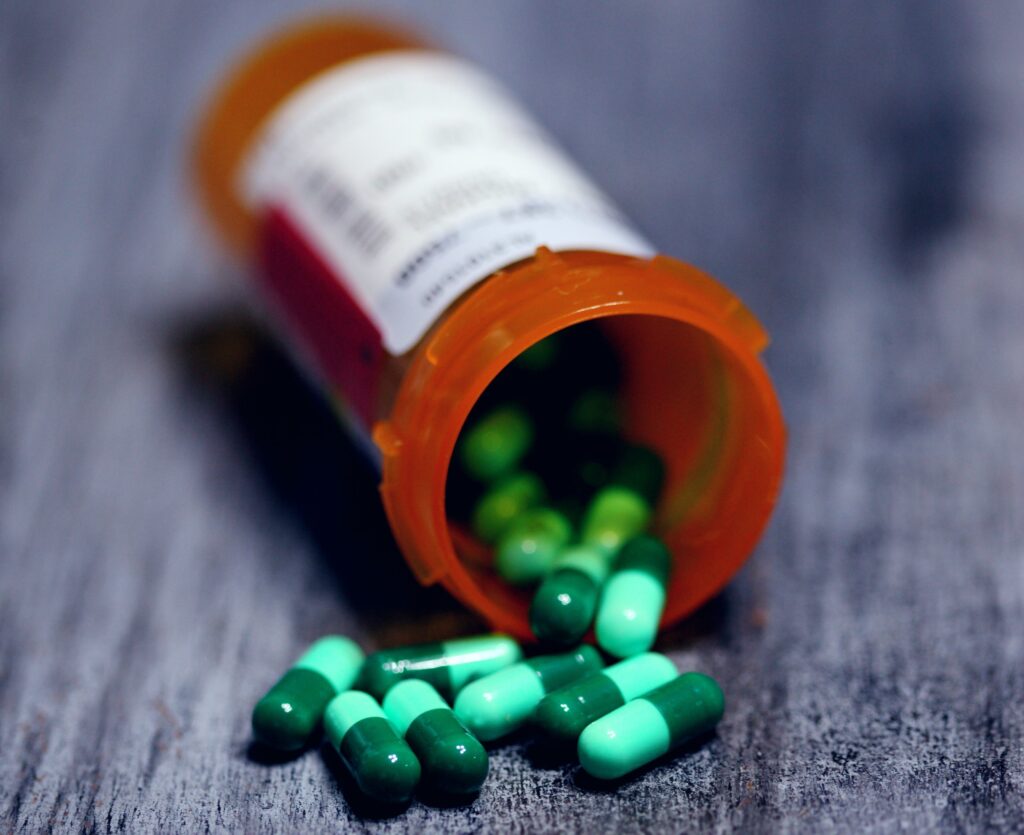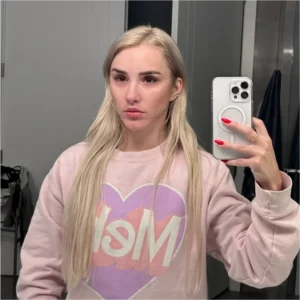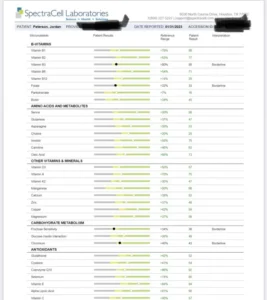So like I wrote in this blog post, I have been searching for the underlying cause of what my and my father’s problems are. Why we can’t eat anything except for meat without having serious autoimmune and mood problems. I haven’t gotten less sensitive on this diet so it’s not purely a gut healing problem.
Guess what I tested positive for? C. Difficile. I tested for Lyme (waiting for results), and some other things, but I also tested for C. Diff because my digestion is SO sensitive. I don’t even really have the symptoms of C. Diff but I tested positive anyway for the toxins that C. Diff releases. Take in this has been the BEST year of my life and this is life with an apparent BACTERIAL INFECTION. Dad is going to get tested but he doesn’t have any symptoms so it’s hard to believe he has it too. I would assume I just have it as well as other problems..
What is C. Difficile? It’s basically a bacteria in your gut (not everyone’s gut) that can cause bloating, diarrhea, nausea, cramping, fever, etc. It can kill people when it gets really bad. It’s more common in people with suppressed immune systems and it’s getting more and more common after antibiotic use or stays in hospitals or nursing homes. Gross. Antibiotics are NOT a good idea unless you’re literally about to die. DO NOT casually take them. We have no idea how dangerous they really are but I’m going to take a stab at it and say pretty frickin bad. Obviously not as bad as dying from an infection, but if you can avoid them, don’t take them. I am not surprised in the least that I have C. Diff and actually a bit relieved. This probably explains why my digestion has been so funky off and on for the last year. Possibly why I had such a rough time transitioning into this diet. Maybe this is also part of the reason I’m so sensitive? I don’t really understand it because I didn’t have any symptoms of C. Diff until I started the all beef diet, and then my digestion has been iffy since then (although it got better after the first 6 weeks), but I never felt like I caught something… So how is that explained? I got C. Diff sometime in the past year, but have stayed asymptomatic autoimmune wise. Or I had it before and had no symptoms? No idea.
In June 2018 I got “food poisoning” which I think was actually this C. Diff. acting up… I had bloating, cramping, fever, and diarrhea for 2 days. It was unpleasant. Then the same “food poisoning” like thing occurred again about 3 weeks ago, I literally couldn’t drink any water for about 24 hours, and then it calmed down. My digestion is normally pretty good but if I do anything wrong it’s messed up. Hell, I even had to ditch salt because of my digestion. I bet that’s the C. Diff because I should be able to eat salt AT LEAST.
This could easily explain that part of the food mystery.

So what to do? Well, I’m sure as hell not taking antibiotics to fix a problem that was probably caused by antibiotics in the first place. That seems super stupid. That’s usually the first way this is treated. I’m NOT doing that. So I’m going to do a gut flora transplant from the Taymount Clinic and will keep everyone posted.
What is a gut flora transplant?
Also known as a fecal matter transplant or stool transplant.
Short and sweet: The Taymount Clinic does gut flora transplants like this:
- Poop from “healthy” donors is taken, and screened for disease. They’re super picky about who can donate. No mental issues, cancer, autoimmune disorders, obesity, gut problems, etc. Basically super healthy people that haven’t taken antibiotics in a long time.
- The microbiome (bacteria) in it is isolated and shipped from the UK to the other clinics around the world.
- That microbiome is stuck up someone else’s butt. Soon to be mine. Sigh.
- They do it over a period of 5-10 days (5 to cure C. Diff, 10 for autoimmune problems so I’m just going to do 10 to give it a real shot). They use a different donor for each transplant so you get as much diversity as you can. 10 different donors worth of bacteria. Wooooo
Worst case scenario I only get rid of the C. Diff., which would be awesome. Best case scenario some of my sensitivities go away. Who knows how much of this sensitivity issue is literally just a microbiome problem. Time will tell.
Those of you who have followed me for a while know I was 100 percent asymptomatic on this diet with some apples and pears, originally. Then I got bronchitis which turned into pneumonia so I took antibiotics, then I took antibiotics again stupidly, then I got pregnant. I think my microbiome got more damaged again back then (2016) and that led me to needing this all beef diet. Which has totally worked to get rid of my autoimmune symptoms and depression… So I guess we’ll see. I’m going to do the GFT in February 2018. I have to get ankle surgery in January 2018 (which means more frickin antibiotics), so I’ll do it after that. I will write a much more in-depth post following that procedure.
Never a slow moment man.
Newest theory that will probably be updated repeatedly:
Maybe your microbiome modulates your immune system so you can tolerate plant toxins. If you’re super depleted in your microbiome diversity because of the way you were born, or the way you eat, or antibiotic use, and you have some sort of gut dysbiosis going on (C. Diff definitely does not help), then maybe you’re missing the bacteria that calm down your immune system when you ingest plant matter. Maybe the reason the all beef diet works is because you’re not triggering your immune system with plant toxins, but if you had the right microbiome you’d be able to tolerate more? Guess we’ll find out this year!





My mother was diagnosed with C-DIFF and after many tests doctors finally went ahead with the fecal matter transplant, which was my recommendation after researching and talking to a trusted doctor friend. She had previously been diagnosed with Crohn’s and ulcerative colitis, so clearly she has autoimmune issues and I’ve tried my best to get her to change her diet, mostly to no avail. But after the transplant, she reported things improving greatly on the digestive front. I really hope she doesn’t have to take antibiotics again, cuz I’m sure they are the culprits for this nasty affliction.
So I’m really happy to hear you have possibly found a cause for your issues, which are pretty similar to my mom’s. Get that transplant, and hopefully you’ll be on the upward swing!
I tried the fecal transplant without success but i had only 2 transplants.
the all beef diet works to relieve my symptoms though (stil not 100% better, progress is very slow, 5 months now).
I’m hope you’ll figure it out so we won’t have to be so paranoid anymore about accidently getting reactions.
C.difficile is actually present in every human gut btw, those fecal/gut tests can make you test positive for e.coli just as well if they want to (e.coli is also in the human gut), but perhaps there is really an imbalance in your case, either way i’m weary of doctors.
“C. difficile is considered a member of the normal gut microflora, however its growth is suppressed by the more dominant anaerobes”
from this article: https://www.ncbi.nlm.nih.gov/pmc/articles/PMC3539291/
Hi Mikhaila,
I recently attended a seminar at my lab by Dr. Purna Kashyap who studies gut microbiomes, IBS, and other gut diseases. I have been following gut microbiome theories and research for some time now because I also suffer from autoimmune diseases and an inability to eat food without getting seriously sick–and I want to get better. Dr. Kashyap’s leading theory is if the diversity of the gut bacteria is destroyed due to disease, antibiotics, etc., nutrient niches are left open for pathogenic microbes (Like C. Diff) to take over. A lot of the food we eat we can’t digest ourselves (like fructans, a simple carbohydrate that is one of my worst enemies), but the bacteria in our gut can break it down, opening up nutrients for us, or creating byproducts that other microbes use to create other byproducts, that other microbes use, etc. More diversity in gut bacteria means less openings in nutrient pathways for opportunistic bad bacteria.
The interplay between host-bacteria and bacteria-bacteria (not to mention all of the other microbes that aren’t bacteria) is an incredibly complex problem, only just beginning to be understood. One of the the main points Dr. Kashyap brought up was we shouldn’t only look at dysbiosis as “a bad microbiome that causes a disease” or “a disease that causes a bad microbiome” (although it is possible in some cases it is that simple), but rather when there’s a dysbiosis of the gut microbiome and there is a disease, the microbiome contributes to the disease, and the disease persists the bad microbiome.
It is interesting to note that human microbiomes are inheritable. Our bacteria are more similar to our family’s and the people (even animals) we live with than strangers. An infant is sterile until it swallows bacteria from its mother during childbirth which will grow in population as the baby grows up (C-section babies have bacteria with characteristics more similar to the bacteria found in hospital environments). The inheritability of gut microbiomes could explain why your father, mother, husband, have also benefited from all beef/no carb diets.
It is also becoming well accepted that bacteria in the gut play an important role in training your immune system the instant you are born and continuing as you grow up. Two quick examples, there was a study (I think it was in the news?) that showed children who were raised in extremely-sanitary environments were more likely to develop childhood cancer, and children with peanut allergies given a specific strand of bacteria along with peanut protein showed reduced or no reaction to peanuts up to 4 years after being given the bacteria and peanut protein daily for 18 months.
If you want to do a full microbiome transplant, you might want to take antibiotics to sterilize your gut environment to give the healthy bacteria a better chance of sticking. After that, you’ll have to eat a variety of food to keep the new bacteria healthy and happy, otherwise they’ll have no nutrients, they’ll die off, and you’ll be back to square one. I don’t know if they’ll have you do any of this for the C. Diff. If they don’t, there’s less chance any dysbiosis beyond the C. Diff will be taken care of.
It is also interesting to note that some bacteria can feed on human cells/material if their normal nutrient sources are eliminated, and some bacteria change into endospores, a dormant state when nutrients are too low or an environment to harsh.
I wish you all the best luck with your poo transplant. I have taken interest in your blog since my sister pointed it out to me, and I will continue to follow your progress with great anticipation. You and your father are inspiring individuals.
Keep fighting the good fight,
-Felicity
Oh man I really hope Mikhaila replies to you Felicity!
“After that, you’ll have to eat a variety of food to keep the new bacteria healthy and happy, otherwise they’ll have no nutrients, they’ll die off, and you’ll be back to square one. I don’t know if they’ll have you do any of this for the C. Diff. If they don’t, there’s less chance any dysbiosis beyond the C. Diff will be taken care of.
It is also interesting to note that some bacteria can feed on human cells/material if their normal nutrient sources are eliminated, and some bacteria change into endospores, a dormant state when nutrients are too low or an environment to harsh.”
That part has me freaking out a little about trying the meat only. Maybe the bacteria going into endospores is what happens when Mikhaila is on the meat only diet and then when just a tiny bit of something the bacteria actually likes gets in there it sort of wakes up and has a hay day.
I really just don’t understand why there is such a lack of proper science regarding food. FOOD…one of the most important and necessary things about life. Gah. All this stuff ties my stomach in knots. I just wish there was a more simple answer and that “regular people” could more easily access real information and contribute to the scientific community even without a degree somehow. I can’t afford to go to university, but I am really good at researching and drawing connections to thing. I suppose it’s possible that I OVER analyze everything and draw connections between EVERYTHING, but still, if there were proper doctors somehow leading interested individuals and groups and could provide oversight to make sure things are still done with proper scientific method etc. maybe we would have better chances at overcoming things. Sort of like capitalism where people could direct their time to the issues that actually impact themselves and their loved ones.
^^does that all make any sense at all?
Hi Casey,
That’s what I’m wondering, that and/or other pathogenic bacteria. Maybe not even pathogenic bacteria, maybe just the wrong ratios of bacteria can lead to problems? I learned a bit more since my first post. C. Diff. definitely turns into endospores. There are also other ways different bacteria go dormant, they’re referred to as “resistant states.”
“I really just don’t understand why there is such a lack of proper science regarding food”
I’ll share my thoughts on this. I know our understanding of how food affects human health and disease is currently being worked on. It probably has been for a long time, but it’s only recently we’ve hit scientific breakthroughs allowing us to begin understanding what is going on in the microscopic world in terms of dna, bacteria, small molecules, etc. to a degree necessary to answer the question. The difficulty is, it’s an extremely complex problem. “Genetic factors are not the major component of chronic disease.” Those words are directly from the mouth of a genetic scientist working on precision health medicine, who’s presentation I attended yesterday. He went on to mention it is environment and exposure that has most control over the manifestation of disease. There is a multi-dimensional interplay between players in the environment: ourselves and bacteria, bacteria and molecules (such as enzymes, proteins, metabolites, toxins, etc.), ourselves and the molecules, the molecules and the molecules, bacteria and viruses, viruses and ourselves, our immune systems and ourselves, our immune systems and the bacteria, ourselves and other people, so on, and so forth. So while eating an apple seems like a simple thing to do, there’s a huge tree of consequences. This leads to experiments that can have billions or trillions of individual elements–how do you know what to look for? You can only capture a tiny fraction of those elements because modern scientific instruments, as innovative and incredibly, creatively designed by geniuses as they are, can only detect certain objects under specific conditions. And then, the information you gather is further limited by the fact that data storage in a computer is finite and calculations on data can easily take decades or longer if you have that much data, which really isn’t hard to do. Another bottleneck is the dreaded (to me anyway) funding. Science costs money. Who’s going to pay for it? Someone has to.
So part of the answer to your question is the science is incredibly, horribly difficult. Another part is that underlying factors, such as the role of bacteria between human and food and immunology, hasn’t been understood until recently as being as important as they are. Think about how many more underlying factors there are we still don’t know we don’t know about! You can’t! Because you don’t know about them! Haha.
I agree with you about the scientific community needing to be more accessible to everyone. I don’t think they keep it closed off on purpose–In fact, I know they don’t keep it closed off on purpose. A lot of groups do scientific studies where data is gathered by “normal” people all the time. Like the American Gut and British Gut projects, but I only found out about those two because I did an extensive search for them.
Did Mikhaila ever end up getting the FMT?
I’ve been on the carnivore diet for 3 years and i’m also looking for the next game changer.
Leave a comment